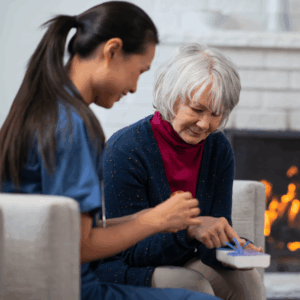As our older people live for longer, more of us are finding ourselves in a position of care for an older person. In Australia, more than 2.65 million people provide unpaid care to family or friends[1]. This care provides an important role in our families, and our society. However, caring for an aging loved one can take a toll. It can result in physical and mental burnout of the carer. Engaging in self-care to look after yourself is important not only for yourself, but also the people you care about. At Home Care Assistance, we understand the toll it can take when caring for an ageing loved one, so we have put together this guide of how to care for yourself when caring for a loved one.
Signs of Caregiver Burnout
Recognising the signs of caregiver burnout is important. If you don’t recognise the signs and act, burnout will only get worse. Signs of caregiver burnout include:
- Feeling rundown
- Difficulty sleeping
- Mental health issues such as depression and anxiety
- Developing health issues
- Trouble concentrating
- Overreacting to issues
- Feeling resentful
- Cutting back on your own activities
- Drinking more alcohol
- Eating more or less
Steps to Avoid Burnout
While recognising burnout is important, so is avoiding it in the first place. Things you can do to avoid carer burnout include:
- Spread the load. Rather than taking everything on yourself, engage other friends and family members to help. This might be assisting with care of the older person or with other activities – such as housework or collecting children from school – that can be done by other people.
- Take time out to look after yourself. When we feel stressed and overwhelmed, taking time out for ourselves is the first thing we tend to stop doing. However, it is the most important thing to keep doing. Even taking a little time out each week, or 10 minutes a day to have an uninterrupted cup of tea, can help.
- Check out the Carer Gateway.[2] This resource can provide you with practical, emotional, and financial support in your role as a carer. The Carer Gateway offers a range of services specifically designed for carers. You can access the Carer’s Gateway online or by calling 1800 422 737 from anywhere in Australia.
- Consider respite care. Even if your long-term plan is to be the carer for your loved one, everyone needs a break occasionally. This is particularly the case when care may be required over an extended period. At Home Care Assistance, we provide not only long-term in-home care through our team of Care Professionals, but also respite care that can be tailored to the needs of your loved one. This can give you a much-needed break while being reassured that your loved one is being looked after.
Looking after an ageing loved one is an important but challenging role. To be able to do this role, you also need to look after yourself. Difficult situations can arise if you reach burnout and are unable to care for yourself or your loved one. Self-care is therefore important whether that be taking time out for yourself, or asking for help if you need a break or the load of being a carer is not sustainable. Implementing the above tips can help you provide sustainable care. There Carer’s Gateway is a great resource for carers. At Home Care Assistance, our Care Professionals can support you through the provision of specific support services or respite care as needed.
Support of an in-home care agency like Home Care Assistance, can bring enormous benefit and comfort to your quality of life while living independently at home. Home Care Assistance has viable solutions when it comes to supporting independent living. For more information, get in touch with a Home Care Assistance near me today.
[1] https://www.abs.gov.au/websitedbs/d3310114.nsf/home/survey+participant+information+-+survey+of+disability+ageing+and+carers
As a leading age care provider, Home Care Assistance offers tailored in-home care services for older Australians, enabling them to live happier and healthier lives in the comfort of their own homes.
We offer private and government subsidised Care Packages and have office locations that are a registered NDIS provider. Our Care Workers undergo extensive training in order to deliver unmatched in-home aged care services where people can continue ageing in place. We are proud ambassadors of the My Aged Care government funded aged care program, enabling Australians to successfully navigate the process and gain approval for in-home care support packages. Home Care Assistance offers hourly care, specialised care, Alzheimer’s and Dementia care, hospital to home care, and 24 hour in home care.













